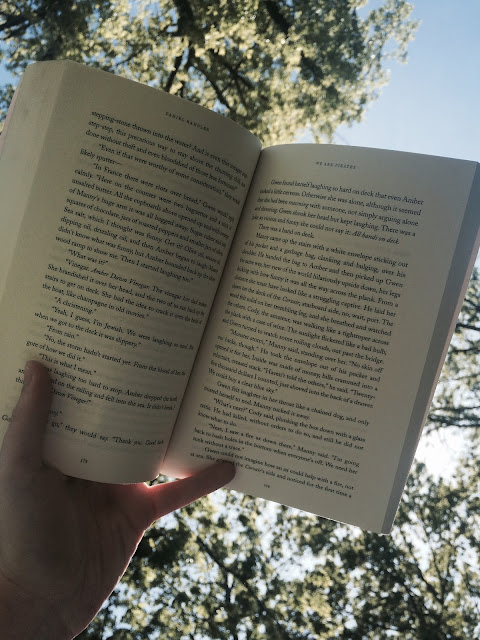The Art of Concealment in Daniel Handler's "We Are Pirates"
Disclaimer: I tried very hard to keep spoilers out of this piece the best I could. I think you can read this review without being fully spoiled for the novel, but do be aware that some still had to come through.
My copy of Daniel Handler’s We Are Pirates still had its receipt in it, stapled to a bookmark advertising “SHIPWRECK: San Francisco’s Primer Literary Erotic Fanfiction Event.” The flier fell on the spotless white couch in the suburban home that I was babysitting at. The huge, smirking shark on the front landed right next to the baby monitor on my lap, and I was suddenly glad that I did not get my book out when said-baby’s parents were still home.
Daniel Handler is famous for his unconventionality. His A Series of Unfortunate Events is the only children’s novel I’ve read that shows a toddler drinking alcohol in despair, which, I believe, is not nearly the most controversial event in Handler’s thirteen-book saga. When I was fifteen, I read and adored his Why We Broke Up, a YA novel that functions as a long breakup letter. Highly poetic and beautifully written, Why We Broke Up was the first YA novel that had a self-hatred monologue in the voice of a fifteen-year-old girl, a voice that my own inner-voice identified with. I appreciated that Handler revealed a teenage girl instead of minimizing her. Still, I spent a long time wondering how a grown man had gotten inside my fifteen-year-old girl mind. Though I now understand the widespread mental health issues that many teenagers have, I still find Handler’s novel to be sophisticated and uncommon. His literature is always odd but revealing.
My experience reading Handler’s We Are Pirates proved, eventually, to be only slightly different than my reading of his other works. Even though We Are Pirates was my first adult novel of Handler’s, I saw parallels from his children’s and YA literature almost instantly. The uncommon narrator, for instance, appears in all of Handler’s works. Additionally, realism made surreal, like in All the Wrong Questions, and an authentic teenage voice, like in Why We Broke Up, prevail in We Are Pirates. I’ve even seen Handler’s fascination with female pirates and “going off the map” before in A Series of Unfortunate Events through his inventive protagonist Violet Baudelaire and his ironic ode to Herman Melville in the final book of the series, The End. And yet, We Are Pirates managed to strike me as intrinsically different than Handler’s other works.
Was it the appearance of the parent’s adventure through Phil, the forty-something wannabe rebel trying to make a big break in a dying entertainment industry, that left me feeling confused? Was it the straight-out murders that his daughter Gwen, a restless fourteen-year-old, commits aboard a stolen, faux-pirate ship with a fellow teenage girl, a kidnapped boy, an immigrant from Haiti, and an elderly man with dementia? I don’t think it was. Rather, I think it was the perspective—and the lack of intention from Handler’s characters—that initially left me frustrated with the novel.
Who is the real pirate here? I wanted to know. Three chapters in, I texted my best friend, who read We Are Pirates last year, to ask her if the whole novel was metaphorical rebellion. So far, the closest Handler had gotten to pirating was through Gwen, who robs a corner store and is banished to community service for her childish crime early in the novel. I found this to differ from Handler’s other works, which often operate on a strict, hilarious, factual tone. One excellent example of this pattern lies in The Hostile Hospital, the eighth-installment of A Series of Unfortunate Events, where one character wears literal stiletto knives for heels, actually “dressing to kill.” Yet We Are Pirates does not initially continue Handler's exploration of ironic literalism. “Will there be sword-fights?” I texted her. “Is there an actual ship?” The answer was yes to both, but in no way that I actually suspected.
Handler’s brilliancy is his duel 21st century-pirate narratives: the opening figurative one and the following literal. Phil, who sleeps with his assistant Levine at the same time that his daughter steals a commercial pirate ship, acts the rebel. Drunk, angry, loving, and brutal, Phil has has sex with Levine in pure want for some kind of high and an escape from his boring life, an attempt that seems reasonable but proves to be idiotic. Gwen, his counterpart, literally becomes a pirate in her own desire for escape. Her reasoning, unlike her father’s, appears to be immature and silly, but her actions are all the more real. Gwen’s choices do not just lead to an assistant’s resignation. She commits murder, loses friends, and walks out of her pirate experience knowing that there is blood on her hands.
However, despite the murders she incites and the mania she creates, the terrifying pirate of Handler’s novel not Gwen but her father, whose self-centered nature and mundane ruthlessness are, in the end, more destructive than Gwen's own desire to escape him. Handler’s excellence truly is his two main characters, whose real reasons to pirate are unknown until the conclusion of the novel. I sympathized with Phil until I realized the truth about him; I despised Gwen until I saw her reality. Their internal narratives obscure the facts of their stories. Handler reveals the fact that Phil is an arrogant asshole of a father and a son even if he loves his child and parent. He shows the truth that Gwen has a right to be savagely angry at her parents, whom she ultimately still loves dearly. But Handler’s mastery is the art of concealment, the escapes that are obviously inevitable, temporary, and yet somewhat uncalled for until the novel is nearly complete. Phil and Gwen are masked; it is only when their eyepatches come off, leading them to drift back to shore, that reality can be seen.
Chilling, charming, and hysterical, Handler’s novel, in the end, reminded me of all the reasons why I love his work. His books are the ones I hide from nice parents I babysit for, ones I sheepishly admit to liking until I find a common admirer of his ironic genius. Though his novels take you off the grind, Handler keeps reality beautifully hideous in the foreground, constantly reminding his readers of the reasons why they wanted to escape in the first place—and yet advising them to ultimately return to the shores they turn away from.



Comments
Post a Comment